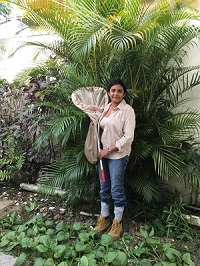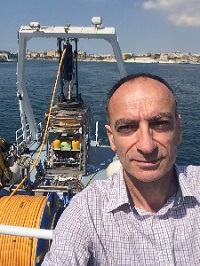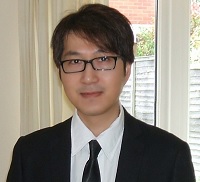Member profiles: Spiders, aquaculture and outreach
Our latest member profiles explore the working lives of Caribbean arachnologist Jo-Anne Nina Sewlal MRSB, marine biologist Joseph A Borg CBiol FRSB, and pharmacologist Nelson Chong FRSB
These profiles appeared in the February / March 2020 issue of The Biologist (Vol 67 No 1)
A Day in the Life
Dr Jo-Anne Nina Sewlal MRSB on life as an expert on the spiders of Caribbean islands

A typical day… might include answering questions about the identity of a species or the common enquiry of “can this kill me?” I might be at an outreach session at a secondary school, or in the field collecting data and specimens to analyse them in the laboratory. Really, no day can be described as typical, which is why I chose to pursue a career in the natural sciences. There is always a new challenge, especially in this part of the world and in this field. Many people are afraid of spiders and don’t see how their existence benefits their lives or the environment. I get to visit the many islands that make up my region, living in the local community for a couple of weeks and making many new friends.
For fieldwork I use… very simple equipment: a sweep-net, vials and vodka (to preserve spiders, not for drinking!). What puts a smile on my face is when I lead a group of students and they realise that spiders are everywhere, even on the beach. After a few passes with my sweep-net the students see how many spiders and insects are in the patch of vegetation they just walked past. When I share more information on spiders and the role that they play in our environment, disgust turns to interest and respect for these creatures, which are only really ‘loved’ at Halloween.
I have discovered… that there was very little literature on the spider fauna of the Caribbean. So I set myself the task of documenting it in the region. This work has taken me to St Kitts, Nevis, Antigua, Anguilla, Grenada, St Vincent, Montserrat, St Lucia, Great Inagua (Bahamas) and St Eustatius. Along the way I have collaborated with scientists from Russia, Bulgaria and Finland on topics including biodiversity, systematics, taxonomy, cytogenetics and biogeography. Public awareness is one of my passions and I have written more than 600 articles in the areas of biodiversity, ecology and the environment, which have been published nationally, regionally and internationally. I have also been quoted by National Geographic and Live Science.
After work… I don’t let my academic work dominate my life. I have a great passion for giving back to my region and community. I am a co-founder of Creative Minds Development Initiative, an NGO that brings educational opportunities in all fields primarily to communities that are geographically isolated. Its flagship project, the Point Fortin Chess Centre in Trinidad and Tobago, has taught over 150 students since 2016, some of whom have come top in national tournaments.
The Career Ladder
Joseph A Borg CBiol FRSB explains how he realised his dream career as a marine biologist

I first discovered biology exploring biota in streams and marine rock pools. I was only around six at the time and was fascinated by aquatic invertebrates. I often ended up keeping specimens in aquaria at home, keenly observing their behaviour for hours on end. My grandfather and my mother both instilled in me a great love for the sea and its creatures, and I owe part of what I do today to them. From the age of seven or eight I accompanied my grandfather on his amateur fishing trips on board his 30-foot ‘luzzu’ (a typical Maltese vessel used for fishing), and my mother showed me how to be a good snorkeller. My grandfather passed away many years ago, but my mother, who turned 80 this year, still goes snorkelling!
I currently work as an associate professor at the University of Malta. I conduct marine biology research, teach biology, and am heavily involved in local consultancy work related to coastal development projects and the assessment and monitoring of aquaculture-environment interactions.
I studied biomedical science after finishing sixth form, since other science degrees were not available in Malta at the time and I could not afford to study abroad. After qualifying as a biomedical scientist, I spent 11 years working in the pathology laboratories at St Luke’s Hospital in Malta.
A pivotal point in my career came in the early 1990s, when I was asked to contribute to the design of new biomedical science courses at the University of Malta. This led to the start of my career as a university academic. By the early 2000s I had established myself in Malta as a leading independent consultant on marine environmental studies. In 2009 my main academic activities changed from biomedical science to biology, which was in line with my long-wished-for academic and research career in marine biology. The latest pivotal point in my career was being appointed head of the Department of Biology. All this brought about new challenges and helped broaden my knowledge extensively.
My Society and Me
Dr Nelson Chong FRSB on interacting with people who are passionate about biology

I am a senior lecturer in pharmacology at the University of Westminster, London, and the senior tutor in the School of Life Sciences. I was elected an RSB Fellow in 2015 and I’ve never looked back. My first Society event was participating in a parliamentary reception at the House of Commons, where I met with other Society members from universities, industry and schools. Such meetings are extremely important for knowledge exchange and they have provided me with a unique insight into how the RSB supports and promotes bioscience. In 2016 I was selected to join the Society’s ‘Ask a Biologist’ project at the inaugural New Scientist Live event. I spent the day engaging with the public on science, medical research and academic life, which I thoroughly enjoyed.
Last year I became an RSB Ambassador and organised my first outreach event for our university Freshers’ Week. This has enabled me to engage with students on a personal level. I am also a member of the Society’s newly formed Membership and Professional Affairs Committee, where we develop strategies to help our members and their organisations achieve their personal, professional and organisational goals. Interacting with an amazing group of people with diverse talents and backgrounds, who are all passionate about biology, is extremely rewarding and would not have been possible without the Society. Through this membership, I have learned a great deal and am proud to be part of this incredibly inspiring and energetic community.


